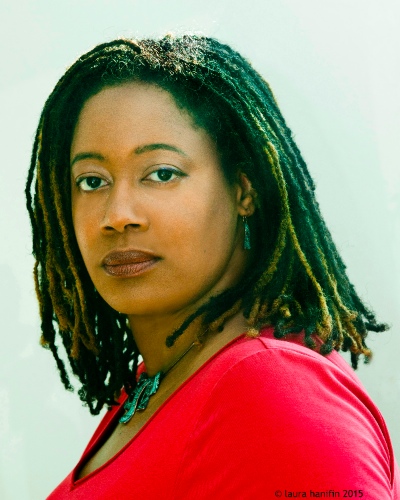“When we say that “the world has ended,” remember—it is usually a lie. The planet is just fine.”
Prologue “me, when I was I” (p. 2)
The Stone Sky (2017)
Nora K. Jemisin è una scrittrice di letteratura fantastica statunitense.
I suoi lavori esplorano un'ampia varietà di temi inclusi i conflitti e l'oppressione culturale. Ha vinto numerosi premi per i suoi lavori inclusi premi Locus e Hugo.
Nel 2010 il suo racconto breve Non-Zero Probabilities è stato un finalista per i premi premio Hugo e Nebula per il miglior racconto breve. Il suo romanzo di debutto, I centomila regni , fu nominato per il Nebula nel 2010 e inserito nella lista breve per il Premio James Tiptree Jr.. Nel 2011 è stata nominata per il Premio Hugo, Premio World Fantasy, e il Premio Locus, vincendo il Locus Award per il miglior primo romanzo. The Hundred Thousand Kingdoms ha vinto anche il premio Sense of Gender nel 2011.
Nel 2016, il suo romanzo La quinta stagione ha vinto il premio Hugo per il miglior romanzo, rendendola la prima autrice afroamericana a vincere un premio Hugo in questa categoria. I due seguiti, The Obelisk Gate e The Stone Sky, hanno vinto rispettivamente il premio Hugo per il miglior romanzo nel 2017 e nel 2018,.
Wikipedia

“When we say that “the world has ended,” remember—it is usually a lie. The planet is just fine.”
Prologue “me, when I was I” (p. 2)
The Stone Sky (2017)
Origine: The Broken Kingdoms (2011), Chapter 11 “Possession” (watercolor) (pp. 202-203)
“It’s all right to need help. All of us have things we can’t do alone.”
Origine: The Broken Kingdoms (2011), p. 1; repeated twice more in the book
Origine: The Broken Kingdoms (2011), Chapter 4 “Frustration” (watercolor) (p. 71)
Origine: The Hundred Thousand Kingdoms (2010), Chapter 7 (p. 74)
Origine: The Hundred Thousand Kingdoms (2010), Chapter 21 (p. 282)
Origine: The Hundred Thousand Kingdoms (2010), Chapter 9 (p. 103)
Origine: The Hundred Thousand Kingdoms (2010), Chapter 29 (p. 394)
More silence.
Origine: The Broken Kingdoms (2011), Chapter 17 “A Golden Chain” (engraving on metal plate) (p. 311)
Origine: The Broken Kingdoms (2011), Chapter 4 “Frustration” (watercolor) (p. 60)
Origine: The Broken Kingdoms (2011), Chapter 9 “Seduction” (charcoal) (p. 185)
“But perhaps that was just the way of power: no such thing as too much.”
Origine: The Hundred Thousand Kingdoms (2010), Chapter 6 (p. 61)
“There’s not such thing as magic that does no harm.”
Origine: The Broken Kingdoms (2011), Chapter 4 “Frustration” (watercolor) (p. 93)
“It is important to appreciate beauty, even when it is evil.”
Origine: The Hundred Thousand Kingdoms (2010), Chapter 7 (p. 75)
Origine: The Hundred Thousand Kingdoms (2010), Chapter 12 (p. 144)
Origine: The Hundred Thousand Kingdoms (2010), Chapter 22 (p. 299)
Origine: The Broken Kingdoms (2011), Chapter 5 “Family” (charcoal study) (p. 105)
“Good intentions are pointless without the will to implement them.”
Origine: The Broken Kingdoms (2011), Chapter 16 “From the Depths to the Heights” (watercolor) (p. 281)
Origine: The Broken Kingdoms (2011), Chapter 19 “The Demons’ War” (charcoal and chalk on black paper) (p. 349)
“What happened when people who’d once possessed absolute power suddenly lost it?”
Origine: The Broken Kingdoms (2011), Chapter 8 “Light Reveals” (encaustic on canvas) (p. 170)
Origine: The Broken Kingdoms (2011), Chapter 17 “A Golden Chain” (engraving on metal plate) (p. 309)
“There is no greater warrior than a mother protecting her child.”
Origine: The Hundred Thousand Kingdoms (2010), Chapter 4 (p. 36)
Origine: The Broken Kingdoms (2011), Chapter 4 “Frustration” (watercolor) (p. 68)
“Love betrayed has an entirely different sound from hatred outright.”
Origine: The Broken Kingdoms (2011), Chapter 3 “Gods and Corpses” (oil on canvas) (p. 58)
Origine: The Broken Kingdoms (2011), Chapter 21 “Still Life” (oil on canvas) (p. 378)
Origine: The Broken Kingdoms (2011), Chapter 9 “Seduction” (charcoal) (p. 189)
Origine: The Broken Kingdoms (2011), Chapter 20 “Life” (oil study) (p. 364)
Origine: The Broken Kingdoms (2011), Chapter 5 “Family” (charcoal study) (p. 120)
“But though I repeated my plea, and waited on my knees for nearly an hour, there was no answer.”
Origine: The Broken Kingdoms (2011), Chapter 9 “Seduction” (charcoal) (p. 181)
“I…regret…what I did. It was wrong. Very wrong. But regret is meaningless.”
Origine: The Broken Kingdoms (2011), Chapter 16 “From the Depths to the Heights” (watercolor) (p. 283)